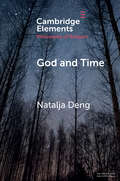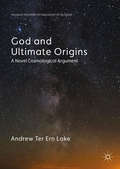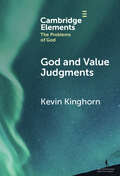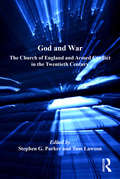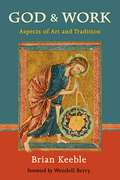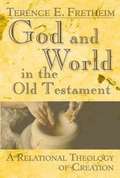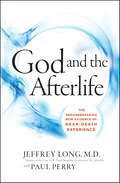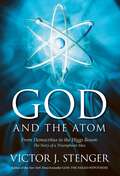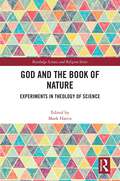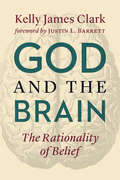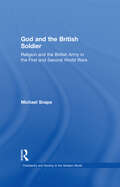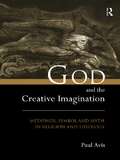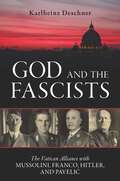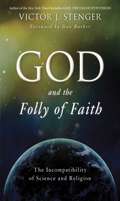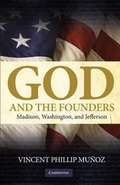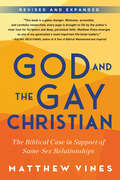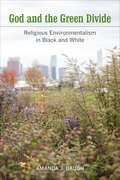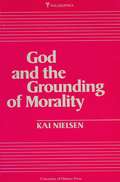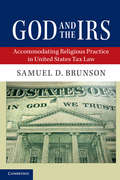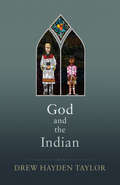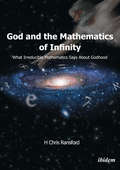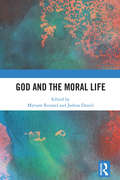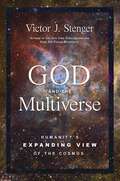- Table View
- List View
God and Time (Elements in the Philosophy of Religion)
by Natalja DengThe God of Western religion is said to be eternal. But what does that mean? Is God somehow beyond time, living a life that does not involve one thing after another? Or is God's relationship to time much more like ours, so that God's eternality just consists in there being no time at which God doesn't exist? Even for non-believers, these issues have interesting implications for the relation between historical and scientific findings on the one hand, and religion on the other. This Element introduces the reader to the requisite metaphysical background, and then examines reasons for and against thinking of God as timeless.
God and Ultimate Origins: A Novel Cosmological Argument (Palgrave Frontiers in Philosophy of Religion)
by Andrew Ter Ern LokeThis book develops a novel argument which combines the Kalam with the Thomistic Cosmological Argument. It approaches an ongoing dispute concerning whether there is a First Cause of time from a radically new point of view, namely by demonstrating that there is such a First Cause without requiring the controversial arguments against concrete infinities and against traversing an actual infinite (although the book presents original defenses of these arguments as well). This book also develops a novel philosophical argument for the Causal Principle, namely that 'everything that begins to exist has a cause', and offers a detailed discussion on whether a First Cause of time can be avoided by a causal loop. It also addresses epistemological issues related to the Cosmological Argument which have been relatively neglected by recent publications, and demonstrates (contra Hawking et al) the continual relevance and significance of philosophy for answering ultimate questions.
God and Value Judgments (Elements in the Problems of God)
by Kevin KinghornHumans continually make judgments that some things have more value than others. Plausibly, it is largely through our value judgments that God intends to guide us in setting priorities and goals. This Element surveys leading accounts of what value judgments are exactly. It then explores the particular values we are apparently sensitive to when making two judgments endemic to human life: about what makes a life good, and about who deserves a good life. Connections are made between differing analyses of human value judgments and views about God's character and the goals God is prompting us to pursue.
God and War: The Church of England and Armed Conflict in the Twentieth Century
by Tom LawsonDespite narratives of secularization, it appears that the British public persistently pay attention to clerical opinion and continually resort to popular expressions of religious faith, not least in time of war. From the throngs of men who gathered to hear the Bishop of London preach recruiting sermons during the First World War, to the attention paid to Archbishop Williams' words of conscience on Iraq, clerical rhetoric remains resonant. For the countless numbers who attended National Days of Prayer during the Second World War, and for the many who continue to find the Remembrance Day service a meaningful ritual, civil religious events provide a source of meaningful ceremony and a focus of national unity. War and religion have been linked throughout the twentieth century and this book explores these links: taking the perspective of the 'home front' rather than the battlefield. Exploring the views and accounts of Anglican clerics on the issue of warfare and international conflict across the century, the authors explore the church's stance on the causes, morality and conduct of warfare; issues of pacifism, obliteration bombing, nuclear possession and deterrence, retribution, forgiveness and reconciliation, and the spiritual opportunities presented by conflict. This book offers invaluable insights into how far the Church influenced public appraisal of war whilst illuminating the changing role of the Church across the twentieth century.
God and Work: Aspects of Art and Tradition
by Brian KeebleThis book is a compilation of Keeble''s insightful essays dealing with the oft-neglected relationship between God and work, spirituality and art, as well as contemplation and action. In the midst of the fast-paced modern world, it addresses the question, how can work become a form of prayer? Keeble focuses on artists and craftsmen such as poet and engraver William Blake, calligrapher Edward Johnston, sculptor Eric Gill, and key figures of the Arts and Crafts movement in Britain.
God and World in the Old Testament: A Relational Theology of Creation
by Terence E. FretheimFretheim presents here the Old Testament view of the Creator God, the created world, and our role in creation. Beginning with "The Beginning," he demonstrates that creation is open-ended and connected. Then, from every part of the Old Testament, Fretheim explores the fullness and richness of Israel's thought regarding creation: from the dynamic created order to human sin, from judgment and environmental devastation to salvation, redemption, and a new creation.
God and a Mouse
by M. AngelaSister Mary Angela describes her mouse as a contemplative and devout mouse, a lover of beauty and a philosopher. Her words are English poetry with the musical emphasis of Spanish-speaking communities.
God and the Afterlife: The Groundbreaking New Evidence for God and Near-Death Experience
by Paul Perry Jeffrey LongThe New York Times–bestselling author presents startling new evidence of God’s existence based on the largest near-death experience study in history. In Evidence of the Afterlife, Dr. Jeffrey Long laid out a strong scientific case for life after death. Now he goes further, revealing evidence that a Supreme Being exists—and there is amazing consistency in the accounts of what he is like.Through his Near Death Experience Research Foundation, Dr. Long collected more than 4,000 reports from people of diverse backgrounds and religious traditions, including nonbelievers, who had credible near-death experiences. Some saw a bright light, others went through a tunnel, still others experienced a review of their life. But many of the accounts shared a remarkably similar description of God; a Supreme Being who radiated love and grace.Expanding on his analysis begun in Evidence of the Afterlife, God and the Afterlife is the first intensive account of the people who have gone to the frontier of heaven, met God, and returned to share their journey. Groundbreaking and profound, it provides new insight into the human experience and expands our notions of mortality, offering possibility, hope, and comfort.
God and the Atom
by Victor J. StengerThis history of atomism, from Democritus to the recent discovery of the Higgs boson, chronicles one of the most successful scientific hypotheses ever devised.Originating separately in both ancient Greece and India, the concept of the atom persisted for centuries, despite often running afoul of conventional thinking. Until the twentieth century, no direct evidence for atoms existed. Today it is possible to actually observe atoms using a scanning tunneling microscope. In this book, physicist Victor J. Stenger makes the case that, in the final analysis, atoms and the void are all that exists. The book begins with the story of the earliest atomists - the ancient Greek philosophers Leucippus, Democritus, and Epicurus, and the Latin poet Lucretius. As the author notes, the idea of elementary particles as the foundation of reality had many opponents throughout history - from Aristotle to Christian theologians and even some nineteenth-century chemists and philosophers. While theists today accept that the evidence for the atomic theory of matter is overwhelming, they reject the atheistic implications of that theory. In conclusion, the author underscores the main point made throughout this work: the total absence of empirical facts and theoretical arguments to support the existence of any component to reality other than atoms and the void can be taken as proof beyond a reasonable doubt that such a component is nowhere to be found.
God and the Book of Nature: Experiments in Theology of Science (Routledge Science and Religion Series)
by Mark HarrisGod and the Book of Nature develops theological views of the natural sciences in light of the recent theological turn in science-and-religion scholarship and the ‘science-engaged theology’ movement. Centered around the Book of Nature metaphor, it brings together contributions by theologians, natural scientists, and philosophers based in Europe and North America. They provide an exploration of complementary (and even contesting) readings of the Book of Nature, particularly in light of the vexing questions that arise around essentialism and unity in the field of science and religion. Taking an experimental and open-ended approach, the volume does not attempt to unify the readings into a single ‘plot’ that defines the Book of Nature, still less a single ‘theology of nature’, but instead it represents a variety of hermeneutical stances. Overall the book embraces a constructive theological attitude toward the modern sciences, and makes significant contributions to the research literature in science and religion.
God and the Brain: The Rationality of Belief
by Kelly James ClarkDoes cognitive science show that religious belief is irrational?Kelly James Clark brings together science and philosophy to examine some of humanity&’s more pressing questions. Is belief in God, as Richard Dawkins claims, a delusion? Are atheists smarter or more rational than religious believers? Do our genes determine who we are and what we believe? Can our very creaturely cognitive equipment help us discover truth and meaning in life? Are atheists any different from Mother Teresa? Clark&’s surprising answers both defend the rationality of religious belief and contribute to the study of cognitive science.God and the Brain explores complicated questions about the nature of belief and the human mind.Scientifically minded, philosophically astute, and reader-friendly, God and the Brain provides an accessible overview of some new cognitive scientific approaches to the study of religion and evaluates their implications for both theistic and atheistic belief.
God and the Brain: The Rationality of Belief
by Kelly James ClarkDoes cognitive science show that religious belief is irrational?Kelly James Clark brings together science and philosophy to examine some of humanity&’s more pressing questions. Is belief in God, as Richard Dawkins claims, a delusion? Are atheists smarter or more rational than religious believers? Do our genes determine who we are and what we believe? Can our very creaturely cognitive equipment help us discover truth and meaning in life? Are atheists any different from Mother Teresa? Clark&’s surprising answers both defend the rationality of religious belief and contribute to the study of cognitive science.God and the Brain explores complicated questions about the nature of belief and the human mind.Scientifically minded, philosophically astute, and reader-friendly, God and the Brain provides an accessible overview of some new cognitive scientific approaches to the study of religion and evaluates their implications for both theistic and atheistic belief.
God and the British Soldier: Religion and the British Army in the First and Second World Wars (Christianity and Society in the Modern World)
by Michael SnapeDrawing on a wealth of new material from military, ecclesiastical and secular civilian archives, Michael Snape presents a study of the experience of the officers and men of Britain’s vast citizen armies, and also of the numerous religious agencies which ministered to them. Historians of the First and Second World Wars have consistently underestimated the importance of religion in Britain during the war years, but this book shows that religion had much greater currency and influence in twentieth-century British society than has previously been realised. Snape argues that religion provided a key component of military morale and national identity in both the First and Second World Wars, and demonstrates that, contrary to accepted wisdom, Britain’s popular religious culture emerged intact and even strengthened as a result of the army’s experiences of war. The book covers such a range of disciplines, that students and scholars of military history, British history and Religion will all benefit from its purchase.
God and the Creative Imagination: Metaphor, Symbol and Myth in Religion and Theology
by Paul Avis'A mere metaphor', 'only symbolic', 'just a myth' - these tell tale phrases reveal how figurative language has been cheapened and devalued in our modern and postmodern culture. In God and the Creative Imagination, Paul Avis argues the contrary: we see that actually, metaphor, symbol and myth, are the key to a real knowledge of God and the sacred. Avis examines what he calls an alternative tradition, stemming from the Romantic poets Blake, Wordsworth and Keats and drawing on the thought of Cleridge and Newman, and experience in both modern philosophy and science.God and the Creative Imagination intriguingly draws on a number of non-theological disciplines, from literature to philosophy of science, to show us that God is appropriately likened to an artist or poet and that the greatest truths are expressed in an imaginative form. Anyone wishing to further their understanding of God, belief and the imagination will find this an inspiring work.
God and the Fascists: The Vatican Alliance with Mussolini, Franco, Hitler, and Pavelic
by Karlheinz DeschnerNow available in English for the first time, a controversial work that indicts the Vatican for its actions before and during World War II. In the decade preceding the outbreak of World War II, the Vatican made a devil's bargain with fascist leaders. Anticipating that their regimes would eliminate a common enemy—namely Marxist-Leninist communism—two popes essentially collaborated with Hitler, Mussolini, and the fascist dictators in Spain (Franco) and Croatia (Pavelić). This is the damning indictment of this well-researched polemic, which for almost five decades in Germany has sparked controversy, outrage, and furious debate. Now it is available in English for the first time. Many will dismiss Deschner—who himself was raised and educated in a pious Catholic tradition—as someone who is obsessed with exposing the failings of the church of his upbringing. But he has marshaled so many facts and presented them with such painstaking care that his accusations cannot easily be ignored. The sheer weight of the evidence that he has brought together in this book raises a host of questions about a powerful institution that continues to exercise political influence to this day.
God and the Folly of Faith: The Incompatibility of Science and Religion
by Victor J. StengerA thorough and hard-hitting critique that is a must read for anyone interested in the interaction between religion and science. It has become the prevalent view among sociologists, historians, and some theistic scientists that religion and science have never been in serious conflict. Some even claim that Christianity was responsible for the development of science. In a sweeping historical survey that begins with ancient Greek science and proceeds through the Renaissance and Enlightenment to contemporary advances in physics and cosmology, Stenger makes a convincing case that not only is this conclusion false, but Christianity actually held back the progress of science for one thousand years. It is significant, he notes, that the scientific revolution of the seventeenth century occurred only after the revolts against established ecclesiastic authorities in the Renaissance and Reformation opened up new avenues of thought. The author goes on to detail how religion and science are fundamentally incompatible in several areas: the origin of the universe and its physical parameters, the origin of complexity, holism versus reductionism, the nature of mind and consciousness, and the source of morality. In the end, Stenger is most troubled by the negative influence that organized religion often exerts on politics and society. He points out antiscientific attitudes embedded in popular religion that are being used to suppress scientific results on issues of global importance, such as overpopulation and environmental degradation. When religion fosters disrespect for science, it threatens the generations of humanity that will follow ours.
God and the Founders
by Vincent Phillip MuñozDid the Founding Fathers intend to build a "wall of separation" between church and state? Are public Ten Commandments displays or the phrase "under God" in the Pledge of Allegiance consistent with the Founders' understandings of religious freedom? In God and the Founders, Dr. Vincent Phillip Muñoz answers these questions by providing new, comprehensive interpretations of James Madison, George Washington, and Thomas Jefferson. By analyzing Madison's, Washington's, and Jefferson's public documents, private writings, and political actions, Muñoz explains the Founders' competing church-state political philosophies. Muñoz explores how Madison, Washington, and Jefferson agreed and disagreed by showing how their different principles of religious freedom would decide the Supreme Court's most important First Amendment religion cases. God and the Founders answers the question, "What would the Founders do?" for the most pressing church-state issues of our time, including prayer in public schools, government support of religion, and legal burdens on individual's religious conscience.
God and the Gay Christian: The Biblical Case in Support of Same-Sex Relationships (Revised and Expanded)
by Matthew VinesThe landmark book exploring what the Bible actually says—and doesn&’t say—about same-sex relationships. Revised and expanded ebook coming May 6!&“This book is a game changer. Every page is brought to life by the author&’s clear love for Scripture and deep, persistent faith. Matthew Vines emerges as one of my generation&’s most important Christian leaders.&”—Rachel Held EvansAs a young Christian man, Matthew Vines harbored the same basic hopes of many young people: to one day share his life with someone, to build a family of his own, to give and receive love. But when Vines realized he was gay, those hopes were called into question. The Bible, he&’d been taught, condemned gay relationships.Feeling the tension between his understanding of the Bible and the reality of his same-sex orientation, Vines devoted years to intensive research into what the Bible says about homosexuality. He asked questions such as:• What was the real sin of Sodom?• What did Paul have in mind when he wrote about same-sex relations?• Is mandatory celibacy biblical?• Can same-sex marriage fulfill Scripture&’s vision for marriage?Accessibly written and carefully argued, God and the Gay Christian shows readers how affirming same-sex relationships can go hand in hand with maintaining moral boundaries and upholding an orthodox Christian faith.
God and the Green Divide: Religious Environmentalism in Black and White
by Amanda J. BaughAmerican environmentalism historically has been associated with the interests of white elites. Yet religious leaders in the twenty-first century have helped instill concern about the earth among groups diverse in religion, race, ethnicity, and class. How did that happen and what are the implications? Building on scholarship that provides theological and ethical resources to support the "greening" of religion, God and the Green Divide examines religious environmentalism as it actually happens in the daily lives of urban Americans. Baugh demonstrates how complex dynamics related to race, ethnicity, and class factor into decisions to "go green." By carefully examining negotiations of racial and ethnic identities as central to the history of religious environmentalism, this work complicates assumptions that religious environmentalism is a direct expression of theology, ethics, or religious beliefs.
God and the Grounding of Morality
by Kai NielsenThese essays make a single central claim: that human beings can still make sense of their lives and still have a humane morality, even if their worldview is utterly secular and even if they have lost the last vestige of belief in God.
God and the IRS: Accommodating Religious Practice In United States Tax Law
by Samuel D. BrunsonSeventy-five percent of Americans claim religious affiliation, which can impact their taxpaying responsibilities.<P> <P>In this illuminating book, Samuel D. Brunson describes the many problems and breakdowns that can occur when tax meets religion in the United States, and shows how the US government has too often responded to these issues in an unprincipled, ad hoc manner. God and the IRS offers a better framework to understand tax and religion. It should be read by scholars of religion and the law, policymakers, and individuals interested in understanding the implications of taxation on their religious practices.<P> Assembles stories of how tax accommodations function in today's world.<P> Provides a history of the development of tax law, religion clauses and tax accommodations.<P> Develops a framework to evaluate and design tax accommodations.
God and the Indian
by Drew Hayden TaylorWhile panhandling outside a coffee shop, Johnny, a Cree woman, is shocked to recognize a face from her childhood, which was spent in a Native American boarding school. Desperate to hear him acknowledge the terrible abuse inflicted on her and other children at the school, Johnny follows Anglican assistant bishop George King to his office to confront him.Ojibway writer Drew Hayden Taylor is the author of twenty-one publications. Hailed by the Montreal Gazette as one of Canada's leading Native dramatists, he writes for the screen and the stage, and contributes regularly to national newspapers.
God and the Mathematics of Infinity: What Irreducible Mathematics Says about Godhood
by H. Chris RansfordDrawing on the science and mathematics of infinity, H. Chris Ransford analyzes the traditional concept of godhood and reaches surprising conclusions. He addresses humankind's abiding core debate on the meaning of spirituality and God. Using mathematics, he explores key questions within this debate: for instance, why does evil exist if there is a God? The book fastidiously does not take sides nor proffers opinions, it only follows allowable mathematics wherever it leads. By doing so, it makes a major contribution to an understanding of the nature of reality.
God and the Moral Life
by Myriam Renaud Joshua DanielHow do various concepts of God impact the moral life? Is God ultimately required for goodness? In this edited collection, an international panel of contemporary philosophers and theologians offer new avenues of exploration from a theist perspective for these important questions. The book features several approaches to address these questions. Common themes include philosophical and theological conceptions of God with reference to human morality, particular Trinitarian accounts of God and the resultant ethical implications, and how communities are shaped, promoted, and transformed by accounts of God. Bringing together philosophical and theological insights on the relationship between God and our moral lives, this book will be of keen interest to scholars of the philosophy of religion, particularly those looking at ethics, social justice and morality.
God and the Multiverse: Humanity's Expanding View of the Cosmos
by Victor J. StengerCosmologists have reasons to believe that the vast universe in which we live is just one of an endless number of other universes within a multiverse-a mind-boggling array that may extend indefinitely in space and endlessly in both the past and the future. Victor Stenger reviews the key developments in the history of science that led to the current consensus view of astrophysicists, taking pains to explain essential concepts and discoveries in accessible terminology. The author shows that science's emerging understanding of the multiverse-consisting of trillions upon trillions of galaxies-is fully explicable in naturalistic terms with no need for supernatural forces to explain its origin or ongoing existence. How can conceptions of God, traditional or otherwise, be squared with this new worldview? The author shows how long-held beliefs will need to undergo major revision or otherwise face eventual extinction.
